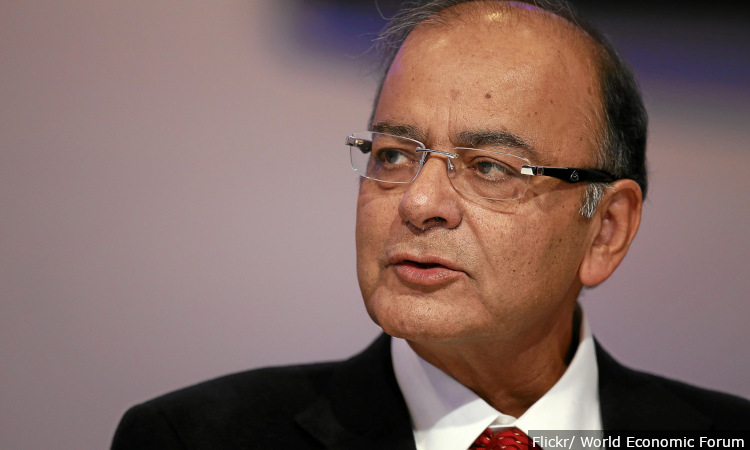Jaitley Claim on Aadhaar + Direct Benefit Transfer Gain of Rs 90,000 Cr Annually Is False

Mumbai: “Poora vishv hairan hai ki ek aisi yojana jo asambhav lagti thi, Aadhaar, ki jo laabh sarkar deti hai, kamzoor vargon ko aur anya vargon ko, vo laabh direct benifit ke roop mein pahunch jae… jo financial inclusion hua, jo Aadhaar lagoo hua, vaarshik bachat 90,000 crore ki hai… 90,000 crore prati varsh ka arth hai Ayushman Bharat jaise char anya yojanaye usme chal sakti hain.”
"The whole world is shocked that a scheme that seemed impossible, i.e Aadhaar, and the benefits that the government provides to weaker sections of society and others in the form of direct benefit transfer (DBT) is working and financial inclusion has happened. The saving due to this is Rs 90,000 crore per year. Rs 90,000 crore per year means four schemes like Ayushman Bharat (National Health Protection Scheme) can be implemented," finance minister Arun Jaitley said on November 2, 2018.
Addressing at the launch of Support and Outreach Initiative for MSMEs, New Delhi, November 2, 2018 https://t.co/TStXi0hrFf
— Arun Jaitley (@arunjaitley) November 2, 2018
Claim: Saving of Rs 90,000 crore due to DBT annually.
Fact: False. The saving of Rs 90,000 crore was cumulative till March 2018 and not every year, according to government data.
Under the Aadhaar-enabled DBT schemes that entail transfer of government subsidies to the bank account of beneficiaries, data show estimated gains by plugging leakages and removal of fake/duplicate beneficiaries till financial year 2016-17 (cumulative) and financial year 2017-18 at Rs 57,029 crore and Rs 32,983.71 crore, respectively.
So, the cumulative savings till March 2018 was Rs 90,012.71 crore.
| Estimated Savings Due To Direct Benefit Transfer | ||
|---|---|---|
| Cumulative till Financial Year 2017 | Financial Year 2017-2018 | Cumulative till March 2018 |
| 57,029 | 32,983.71 | 90,012.71 |
Source: DBTBharat
Note: Figures in Rs crore
“Today, the Aadhaar operation has led to empowerment of poor people and saving of Rs 90,000 crore public money,” according to this reply to the Rajya Sabha (upper house of Parliament) by electronics and information minister Ravi Shankar Prasad on August 3, 2018.
The annexure to the reply also shows that Rs 57,029 crore saved was cumulative till March 2017 and Rs 32,983.71 crore was saved during financial year 2017-18, and not Rs 90,000 crore every year, as claimed by Jaitley.
But this government claim of Rs 90,000 crore as savings from Aadhaar and DBT are disputed by various studies (here & here), which contend that savings from the removal of fake/duplicates in cooking-gas subsidies, the public distribution system for subsidised food and the rural employment scheme (MNREGA) are exaggerated.
The government’s estimates of savings do not stand up to scrutiny, and whatever is termed as savings is often the result of a denial of legal entitlements, Reetika Khera, economist, IIM-Ahmedabad, wrote in December 2017 for the Economics & Political Weekly.
"In its current form, the Aadhaar project undermines the right to life," wrote Khera, who said the government has failed to hold to account the minority who indulged in corrupt practices. Instead, by deploying “untested and fragile technology”, the “victims of corruption are paying the price”, she wrote.
The benefits of Aadhaar are unclear, and the impact of direct benefit transfers it will be used to deliver to the poor is not studied enough, a study published by an arm of the Reserve Bank of India concluded, IndiaSpend reported on January 9, 2018.
The government has said that direct transfers of subsidies to cooking-gas consumers have saved Rs 14,672 crore ($2.2 billion), but it caused a loss of Rs 97 crore ($14 million), according to an analysis by the Global Subsidies Initiative, a part of Canada-based International Institute For Sustainable Development, FactChecker reported on March 19, 2016.
DBT was started in 2013, and expanded across entitlement-based centrally sponsored schemes in February 2015.
State and central ministries have been reporting gains using Aadhaar as an identifier as per this reply by the government to the Lok Sabha (lower house of Parliament) on March 31, 2017.
Update (November 10, 2018, 12:30 PM):
The copy has been updated to reflect that the government’s claims on savings due to Aadhaar and DBT are disputed.
Disclosure:
IndiaSpend and FactChecker.in founder Govindraj Ethiraj volunteered with UIDAI, an arm of Planning Commission, Government of India, in 2011.
Nandan Nilekani was Chairman of UIDAI from 2009 to 2014.
Rohini Nilekani donated to IndiaSpend between April 2013 and January 2015. Rohini's donations have been made in her name only.
(Anmol Alphonso is an intern with IndiaSpend and FactChecker.)
We welcome feedback. Please write to respond@indiaspend.org. We reserve the right to edit responses for language and grammar.


